新概念第一册 Lesson 83-84课件(共103张PPT)
文档属性
| 名称 | 新概念第一册 Lesson 83-84课件(共103张PPT) | 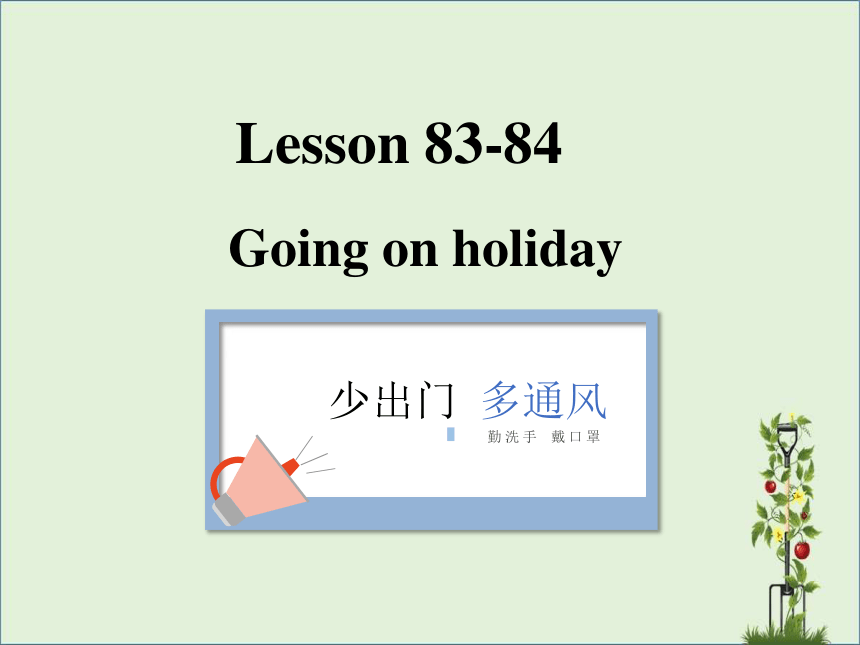 | |
| 格式 | pptx | ||
| 文件大小 | 6.9MB | ||
| 资源类型 | 教案 | ||
| 版本资源 | 新概念英语 | ||
| 科目 | 英语 | ||
| 更新时间 | 2024-07-30 08:12:42 | ||
图片预览

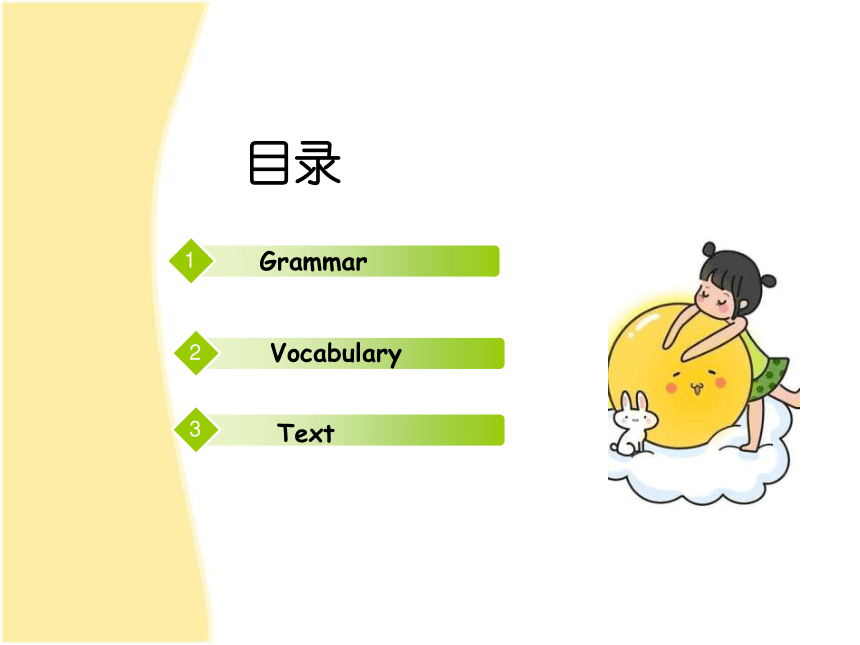
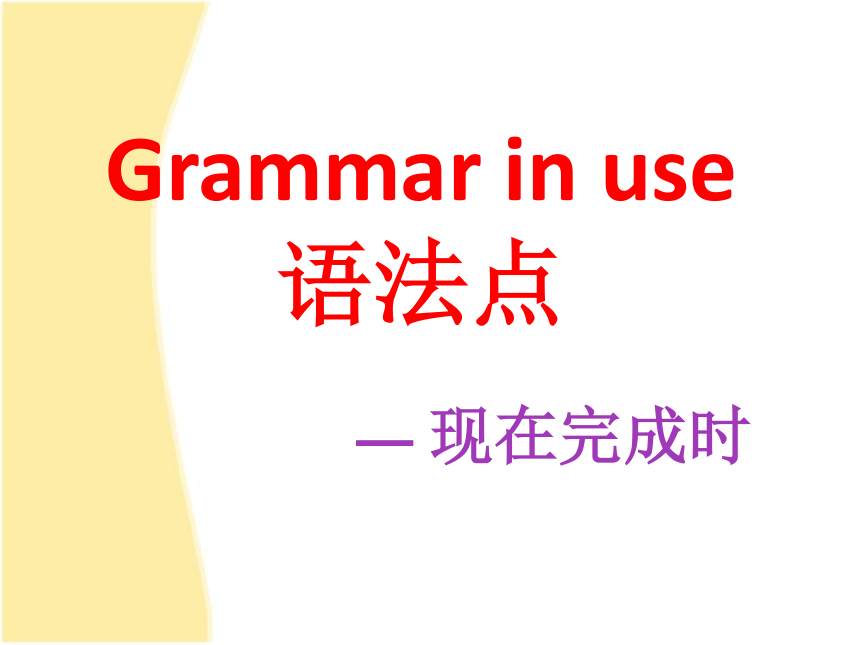
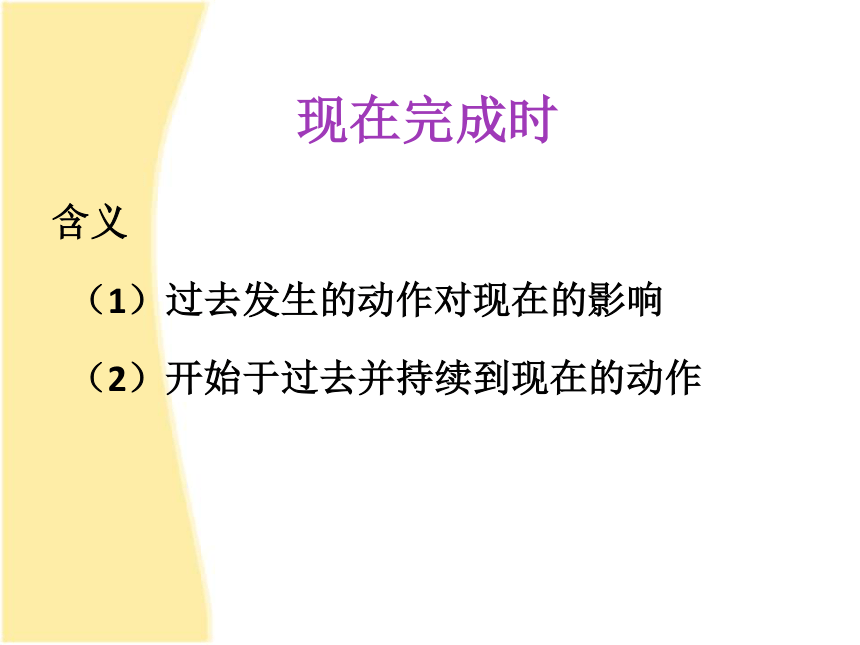
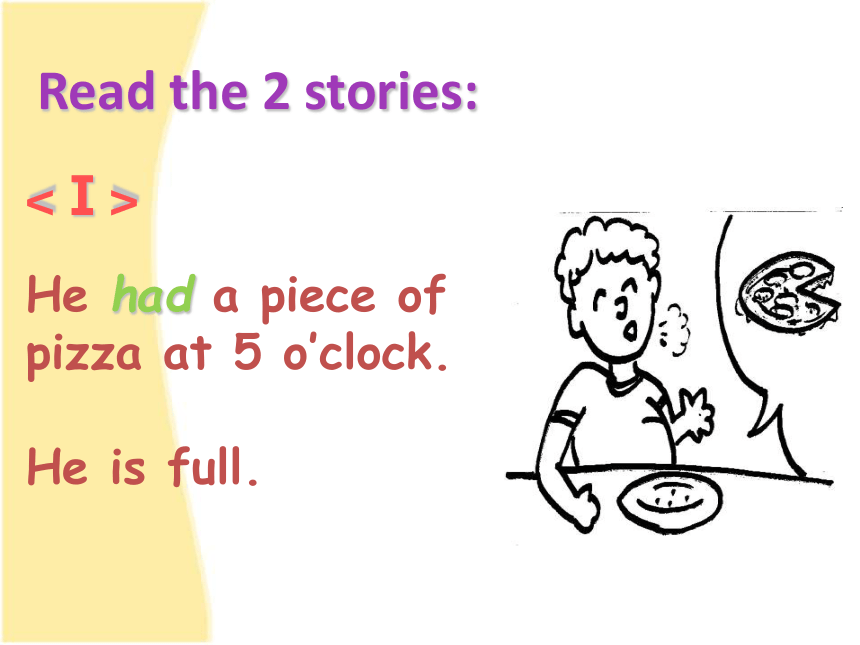
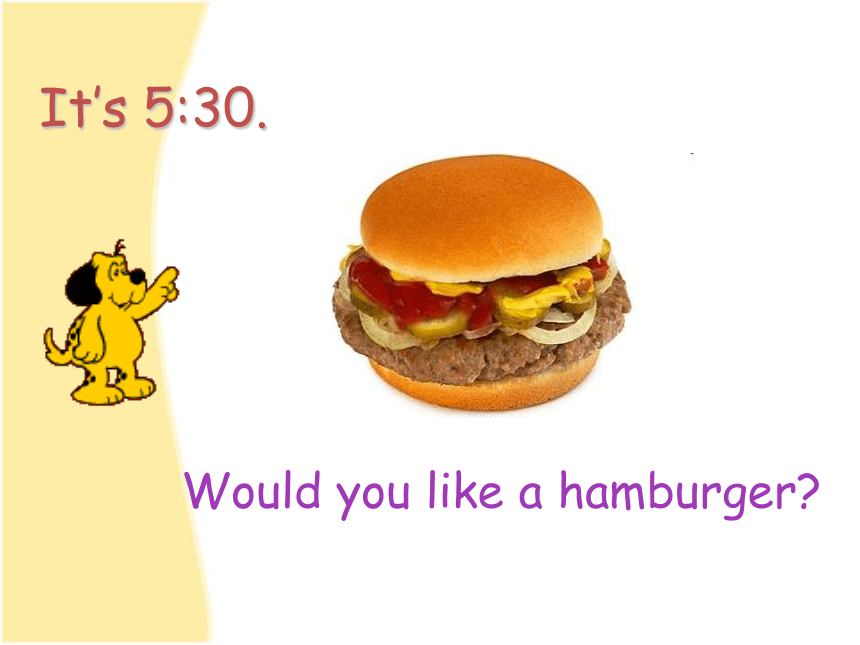
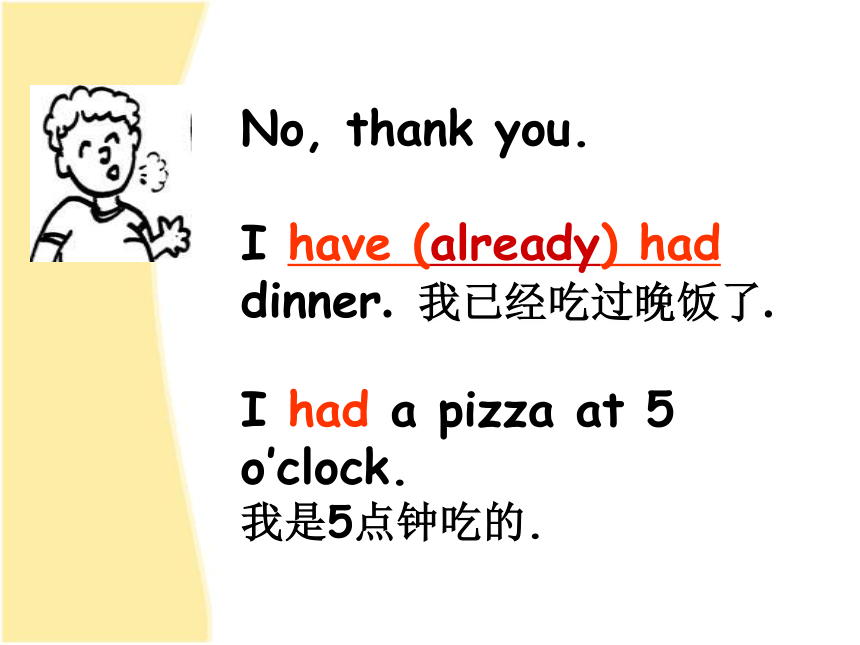

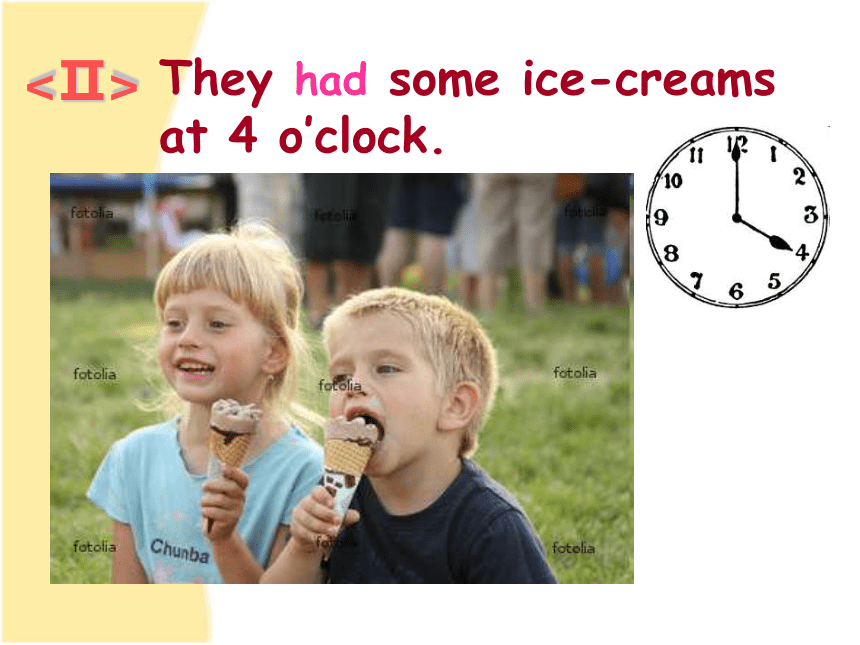
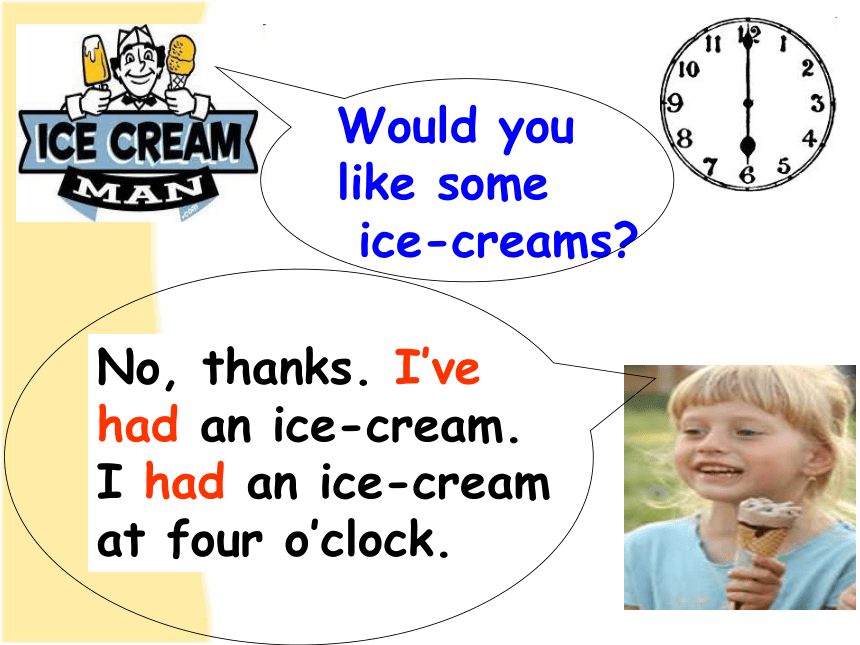
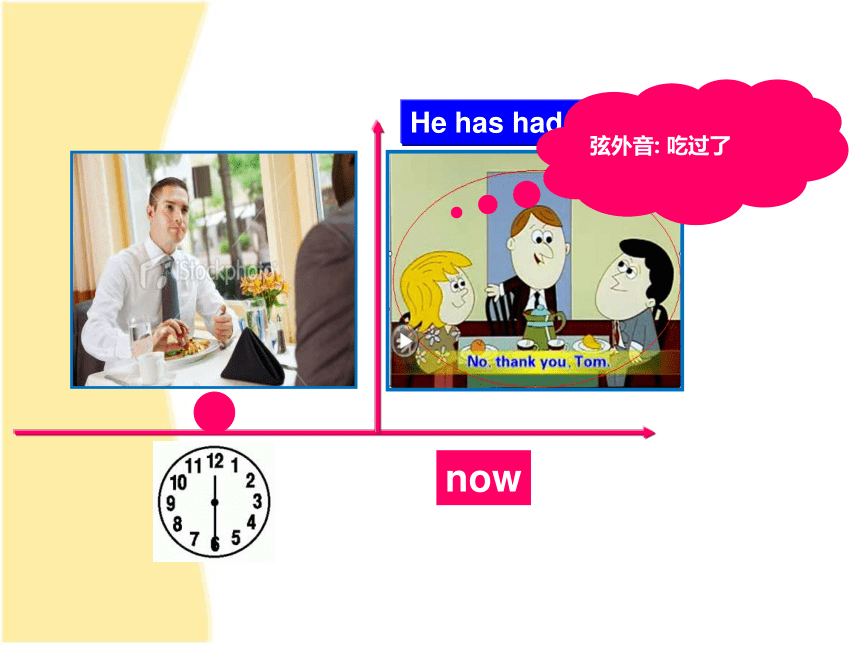
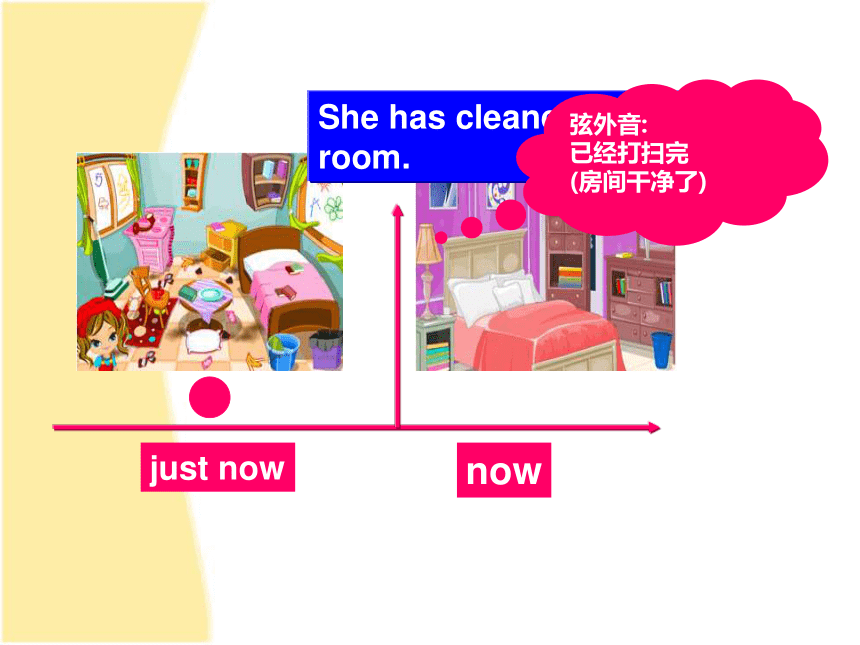
文档简介
(共103张PPT)
少出门 多通风
勤洗手 戴口罩
Lesson 83-84
Going on holiday
目录
Grammar
1
Vocabulary
2
Text
3
Grammar in use
语法点
— 现在完成时
现在完成时
含义
(1)过去发生的动作对现在的影响
(2)开始于过去并持续到现在的动作
He had a piece of pizza at 5 o’clock.
He is full.
Read the 2 stories:
<Ⅰ>
It’s 5:30.
Would you like a hamburger
No, thank you.
I have (already) had
dinner. 我已经吃过晚饭了.
I had a pizza at 5 o’clock.
我是5点钟吃的.
Would you like some coffee
No, thank you.
I have (just) had a cup.
我刚喝过一杯了.
They had some ice-creams
at 4 o’clock.
<Ⅱ>
Would you like some
ice-creams
No, thanks. I’ve had an ice-cream.
I had an ice-cream at four o’clock.
now
He has had lunch.
弦外音: 吃过了
just now
now
She has cleaned the room.
弦外音:
已经打扫完
(房间干净了)
I have had dinner.
I have had a cup.
I have had an ice-cream.
I have had…
我已经吃过/喝过/从事了…
↑
助动词
↓吃
公式:
I have had dinner.
S(主语)+ have/ has + 动词过去分词
现在完成时
↓
have是助动词,无实义
现在完成时中动词形态
↑
构成
肯定句: has/have + 动词的过去分词
否定形式:hasn't/haven't + 动词的过去分词
疑问形式:把 has/have 提前
我已经吃过午饭了。
I have had lunch.
我没吃午饭呢。
I haven’t had lunch.
你吃午饭了吗?
Have you had lunch
现在完成时的时间状语
already 已经
yet 还
just 刚刚
ever 在任何时候,曾经
never 从不
for+ 一段时间
since+ 时间点
already“已经” just “刚刚”
I've already +动词过去分词:
表示“我已经...”
I've already had lunch.
我已经吃过午餐了。
I've just+动词过去分词:
表示“我刚....”
I've just had a cup.
我刚刚喝了一杯。
使用现在完成时的几种情况:
NCE
谈论过去发生的事情,但是发生的时间不重要.
e.g. She has broken her arm.
她伤了她的胳膊.
2. 谈论过去发生的某事,但对现在造成了影响
e.g. She has broken her arm, so she can’t play basketball.
她伤了她的胳膊, 所以她不能打篮球了.
3. 过去开始的某事,现在还在继续.
e.g. He has lived in China for 20 years.
他已经在中国住了20年了.
He has lived in China since 1993.
4. 刚刚发生的事情.
e.g. They have just arrived at the airport.
他们刚刚到达了机场.
NCE
5. 经历或取得的成就.
e.g. He has passed his math exam with a high mark.
他以高分通过了他的数学考试.
不规则动词的过去式以及过去分词
巧记规律
AAA: put– put –put let—let –let
ABA: become—became—become
ABB: stand—stood—stood
ABC: eat— ate—eaten
cost-cost-cost read-read-read
put-put-put cut-cut-cut
let-let-let set-set-set
beat-beat-beat hit-hit-hit
hurt-hurt-hurt
原形、过去式和过去分词的词形和读音都相同的单词,结尾字母一般是t或d。
特殊:动词read的过去式和过去分词虽然词形与原形一致,read-read-read,但发音分别是[ri:d]-[red]-[red]。
AAA
有些动词的过去分词与原形是一样的:
run-ran-run
come-came-come
become-became-become
overcome-overcame-overcome
ABA
原型 过去式 过去分词 例词
-eep -ept -ept keep,sweep,sleep
-ell -old -old sell,tell
-d -t -t lend,spend,send,build
-ay -aid -aid say,pay,lay
-n -nt -nt burn,learn,mean
-ee- -e- -e- meet,feed
-ought -ought bring,buy,fight,think
-aught -aught catch,teach
ABB(含规则动词)
1.另有一些其它形式的变化
have (has)-had-had leave-left-left
lose-lost-lost make-made-made
feel-felt-felt spell-spelt-spelt
stand-stood-stood
2. 改变单词中间元音字母
sit-sat-sat (babysit) win-won-won
shine-shone-shone hold-held-held
find-found-found hear-heard-heard
hang-hung (hanged)-hung (hanged)
ABB(含规则动词)
ABC
原型 过去式 过去分词 例词
-eak -oke -oken break,speak
-eal -ole -olen steal
-ear -ore -orn wear,bear,tear
-ow(aw) -ew -own grow,blow,know,
throw,draw
-i- -a- -u- sink,swim,drink,ring,
sing,begin
-i- -o- -n drive,rise,ride,write
ABC
有些动词的过去分词是在原形词尾加n或en,变成以en结尾的单词。
take-took-taken give-gave-given
fall-fell-fallen eat-ate-eaten
write-wrote-written speak-spoke-spoken
freeze-froze-frozen ride-rode-ridden
get-got-gotten (got) forget-forgot-forgotten (forgot)
特殊:
am/is-was-been are-were-been,
do (does)-did-done go-went-gone
see-saw-seen show-showed-shown (showed)
lie-lay (lied)-lain (lied)
现在完成时态练习题
1.We_____just ______(talk)about you.
2.______you_____(visit)the Great Wall yet
3.How long _____ you _____(teach) English in this school
4.He __________(work) at this school since he was 24.
5.He_________(be)to Shanghai for several times.
6.Sorry,he isn’t here. He _________(go) to Bei jing.
2024/7/25
have
talked
Have
visited
have
taught
Has worked
Has been
Has gone
2024/7/25
注意区别
have /has been to 曾经去过某地回来了
Tom has been to Beijing.(去过北京,现不在北京)
have /has gone to 去过某地还没回来
Tom has gone to Beijing.(去北京了,不在这里)
have /has been in 一直待在某地
Tom has been in Beijing for 10 years.
(在北京待了10年,现还在北京)
现在完成时VS一般过去时
Exercises
1. Tom ______already ______in this school for 6 years.
A. was ; studying B. will ; study
C. has ; studied D. are ; studying
△ already adv.已经
一般与现在完成时连用,是现在完成时的重要标志
一般放于have/has之后, 过去分词之前
e.g. I have already had lunch.
2. Harry Potter is a very nice film. I ______it twice.
A. will see B. have seen C. saw D. see
3. Jim 已经喝了一杯牛奶了.
Jim _____ already had ____cup ____ milk.
4.翻译
我妈妈已经喝过咖啡了.
My mother has already had some coffee.
has
a
of
Open your books and finish Part A on Page 172.
注意:
countable nouns(可数名词):one
uncountable nouns(不可数名词):some
Student A guess : What have you had
Have you had…
B: I haven’t had ...
I’ve just had some....
e.g. A: Have you had some bread
B: No, I haven’t had some bread,
I’ve just had some dumplings.
Open your book and finish Part B of page 172.
I
肯定句:I've already had some lettuce.
否定句:I haven't had any lettuce.
疑问句: Have you had any lettuce
回答: Yes, I have./No, I haven't.
肯定句:I've already had some beer.
否定句:I haven't had any beer.
疑问句: Have you had any beer
回答: Yes, I have./No, I haven't.
肯定句:He has just had some tea.
否定句:He hasn't had any tea.
疑问句: Has he had any tea
回答: Yes,he has./No, he hasn't.
he/just
肯定句:They've already had an apple.
否定句:They haven't had an apple.
疑问句: Have they had an apple
回答: Yes,they have./No,they haven't.
they
A: Have you had any fruit or vegetables
B: I haven't had any fruit. But I have had some vegetables.
A: Has she had any oranges or peaches
B: She hasn't had any oranges. But she has had some peaches.
she
A: Have they had any cabbage or beans
B: They haven't had any cabbage. But they have had some beans.
they
Topic
Where did you go on summer vacation
go to theme park (主题公园)
travel(旅游)
stay at home watch Tv
Before traveling
mess: 杂乱
pack: 打包,装箱
suitcase: 手提箱
She is going to pack her suitcases.
mess [mes] n.杂乱,凌乱
pack [p k] v.打包,装箱
suitcase ['su tke s, 'sju:t] n.手提箱
leave [li:v] (left, left) v.离开
already [ :l'redi] adv.已经
New words
1. in a mess = at sixes and sevens
乱七八糟的(状态或局面)
你的房间乱七八糟的.
Your room is in a mess.
2. Excuse the mess.
乱七八糟的,请原谅。
mess n. 杂乱,凌乱的状态
pack /p k/
v. 打包
pack the suitcase
打包行李
bookcase
suitcase n.手提箱
suit 西装,套装 case 箱子,盒子
leave v. 离开
leave – left – left
leave sp.
他将要离开北京。
He is going to leave Beijing.
leave for sp.
他将离开去北京。
He is going to leave for Beijing.
leave sp. for sp.
他将要离开北京去上海。
He is going to leave Beijing for Shanghai.
already adv.已经(现完标志)
我已经吃过我的早饭了。
I have already had my breakfast.
already 用于肯定句
yet用于否定句或疑问句,表示还没有。
我还没有吃早饭。
I have not had my breakfast yet.
你吃过早饭了吗
Have you had your breakfast yet
Tom and Carol
Read and answer
Where did Sam go for his holiday this year
Carol: Hello, e in.
Tom: Hi, Sam. We’re having lunch.
Do you want to have lunch with us
Sam: No, thank you, Tom.
I’ve already had lunch.
I had lunch at half past twelve.
Carol: Have a cup of coffee then.
Sam: I’ve just had a cup, thank you.
I had one after my lunch.
Tom: Let’s go into the living room, Carol.
We can have our coffee there.
Carol: Excuse the mess, Sam.
This room’s very untidy.
We’re packing our suitcases.
We’re going to leave tomorrow.
Tom and I are going to have a holiday.
Sam: Aren’t you lucky!
Tom: When are you going to
have a holiday, Sam
Sam: I don’t know.
I’ve already had my holiday this year.
Carol: Where did you go
Sam: I stayed at home.
1. We’re having lunch.
have实义动词
吃早饭
have breakfast
抽根烟
have a cigarette
洗个澡
have a bath
喝杯橙汁
have a glass of orange juice
with sb. 和某人一起
我每天早上和Lucy一起上班。
I go to work with Lucy every morning.
你也跟我们一道来吗
Will you come with us, too
2. Do you want to have lunch with us
Let’s do sth 让我们做某事
※let’s 后面要跟动词原形
我们走吧!
Let’s go.
我们开个会吧!
Let’s hold /have a meeting.
3. let’s go into the living room.
let’s后面要用动词原形。
let’s 包括对方。
Let’s go! Let’s have some tea.
let us 不包括对方。
Mum, please let us play football.
注意:let’s have some tea, shall we
我们一起喝茶怎么样?
Let us go home, will you
让我们回家吧,好吗?
2024/7/25
untidy = messy
tidy-untidy
happy-unhappy
comfortable-uncomfortable
lucky-unlucky
sure-unsure
fair-unfair
单词前加“un”表示否定前缀
4. Excuse the mess, this room is untidy.
We’re going to leave tomorrow.
= We’re leaving tomorrow.
当动词是leave, go, come, arrive等时,可以用现在进行时表将来。
(有人叫你时)I’m coming.
他今天晚上就到。
He’s arriving tonight.
5. We’re going to leave tomorrow.
6.Tom and I are going to have a holiday.
说两个人的顺序时,一般把别人放在自己之前,以示尊敬。
be going to do sth. 一般将来时(表示计划、打算做某事)。
have a holiday 度假【回顾】have的用法。
7. Aren’t you lucky! 你们可真幸运哪!
否定疑问句表感叹。
8. I’ve already had my holiday this year.
现在完成时(画外音:我今年不能再休假了。)
2024/7/25
这里的home是名词,前面用介词at,但不用加冠词the。
而在go home, arrive home中home是地点副词,所有前面不加介词。
2024/7/25
9. I stayed at home.
Grammar in use
语法点
— 现在完成时
现在完成时
含义
(1)过去发生的动作对现在的影响
(2)开始于过去并持续到现在的动作
He had a piece of pizza at 5 o’clock.
He is full.
Read the 2 stories:
<Ⅰ>
It’s 5:30.
Would you like a hamburger
No, thank you.
I have (already) had
dinner. 我已经吃过晚饭了.
I had a pizza at 5 o’clock.
我是5点钟吃的.
Would you like some coffee
No, thank you.
I have (just) had a cup.
我刚喝过一杯了.
They had some ice-creams
at 4 o’clock.
<Ⅱ>
Would you like some
ice-creams
No, thanks. I’ve had an ice-cream.
I had an ice-cream at four o’clock.
I have had dinner.
I have had a cup.
I have had an ice-cream.
I have had…
我已经吃过/喝过/从事了…
↑
助动词
↓吃
公式:
I have had dinner.
S(主语)+ have/ has + 动词过去分词
现在完成时
↓
have是助动词,无实义
现在完成时中动词形态
↑
构成
肯定句: has/have + 动词的过去分词
否定形式:hasn't/haven't + 动词的过去分词
疑问形式:把 has/have 提前
我已经吃过午饭了。
I have had lunch.
我没吃午饭呢。
I haven’t had lunch.
你吃午饭了吗?
Have you had lunch
现在完成时的时间状语
already 已经
yet 还
just 刚刚
ever 在任何时候,曾经
never 从不
for+ 一段时间
since+ 时间点
already“已经” just “刚刚”
I've already +动词过去分词:
表示“我已经...”
I've already had lunch.
我已经吃过午餐了。
I've just+动词过去分词:
表示“我刚....”
I've just had a cup.
我刚刚喝了一杯。
使用现在完成时的几种情况:
NCE
谈论过去发生的事情,但是发生的时间不重要.
e.g. She has broken her arm.
她伤了她的胳膊.
2. 谈论过去发生的某事,但对现在造成了影响
e.g. She has broken her arm, so she can’t play basketball.
她伤了她的胳膊, 所以她不能打篮球了.
3. 过去开始的某事,现在还在继续.
e.g. He has lived in China for 20 years.
他已经在中国住了20年了.
He has lived in China since 1993.
4. 刚刚发生的事情.
e.g. They have just arrived at the airport.
他们刚刚到达了机场.
NCE
5. 经历或取得的成就.
e.g. He has passed his math exam with a high mark.
他以高分通过了他的数学考试.
不规则动词的过去式以及过去分词
巧记规律
AAA: put– put –put let—let –let
ABA: become—became—become
ABB: stand—stood—stood
ABC: eat— ate—eaten
cost-cost-cost read-read-read
put-put-put cut-cut-cut
let-let-let set-set-set
beat-beat-beat hit-hit-hit
hurt-hurt-hurt
原形、过去式和过去分词的词形和读音都相同的单词,结尾字母一般是t或d。
特殊:动词read的过去式和过去分词虽然词形与原形一致,read-read-read,但发音分别是[ri:d]-[red]-[red]。
AAA
有些动词的过去分词与原形是一样的:
run-ran-run
come-came-come
become-became-become
overcome-overcame-overcome
ABA
原型 过去式 过去分词 例词
-eep -ept -ept keep,sweep,sleep
-ell -old -old sell,tell
-d -t -t lend,spend,send,build
-ay -aid -aid say,pay,lay
-n -nt -nt burn,learn,mean
-ee- -e- -e- meet,feed
-ought -ought bring,buy,fight,think
-aught -aught catch,teach
ABB(含规则动词)
1.另有一些其它形式的变化
have (has)-had-had leave-left-left
lose-lost-lost make-made-made
feel-felt-felt spell-spelt-spelt
stand-stood-stood
2. 改变单词中间元音字母
sit-sat-sat (babysit) win-won-won
shine-shone-shone hold-held-held
find-found-found hear-heard-heard
hang-hung (hanged)-hung (hanged)
ABB(含规则动词)
ABC
原型 过去式 过去分词 例词
-eak -oke -oken break,speak
-eal -ole -olen steal
-ear -ore -orn wear,bear,tear
-ow(aw) -ew -own grow,blow,know,
throw,draw
-i- -a- -u- sink,swim,drink,ring,
sing,begin
-i- -o- -n drive,rise,ride,write
ABC
有些动词的过去分词是在原形词尾加n或en,变成以en结尾的单词。
take-took-taken give-gave-given
fall-fell-fallen eat-ate-eaten
write-wrote-written speak-spoke-spoken
freeze-froze-frozen ride-rode-ridden
get-got-gotten (got) forget-forgot-forgotten (forgot)
特殊:
am/is-was-been are-were-been,
do (does)-did-done go-went-gone
see-saw-seen show-showed-shown (showed)
lie-lay (lied)-lain (lied)
现在完成时态练习题
1.we_____just ______(talk)about you.
2.______you_____(visit)the Great Wall yet
3.How long _____ you _____(teach) English in this school
4.He __________(work) at this school since he was 24.
5.He_________(be)to Shanghai for several times.
6.Sorry,he isn’t here. He _________(go) to Bei jing.
2024/7/25
have
talked
Have
visited
have
taught
Has worked
Has been
Has gone
2024/7/25
注意区别
have /has been to 曾经去过某地回来了
Tom has been to Beijing.(去过北京,现不在北京)
have /has gone to 去过某地还没回来
Tom has gone to Beijing.(去北京了,不在这里)
have /has been in 一直待在某地
Tom has been in Beijing for 10 years.
(在北京待了10年,现还在北京)
现在完成时VS一般过去时
Exercises:
c
1. Tom ______already ______in this school for 6 years.
A. was ; studying B. will ; study
C. has ; studied D. are ; studying
△ already / :l redi / adv.已经
一般与现在完成时连用,是现在完成时的重要标志
一般放于have/has之后, 过去分词之前
e.g. I have already had lunch.
2. Harry Potter is a very nice film. I ______it twice.
A. will see B. have seen C. saw D. see
3. Jim 已经喝了一杯牛奶了.
Jim _____ already had ____cup ____ milk.
4.翻译;
我妈妈已经喝过咖啡了.
My mother has already had some coffee.
B
has
a
of
Open your books and finish Part A on Page 172.
注意:
countable nouns(可数名词):one
uncountable nouns(不可数名词):some
Student A guess : What have you had
Have you had…
B: I haven’t had ...
I’ve just had some....
e.g. A: Have you had some bread
B: No, I haven’t had some bread,
I’ve just had some dumplings.
Open your book and finish Part B of page 172.
I
肯定句:I've already had some lettuce.
否定句:I haven't had any lettuce.
疑问句: Have you had any lettuce
回答: Yes, I have./No, I haven't.
肯定句:I've already had some beer.
否定句:I haven't had any beer.
疑问句: Have you had any beer
回答: Yes, I have./No, I haven't.
肯定句:He has just had some tea.
否定句:He hasn't had any tea.
疑问句: Has he had any tea
回答: Yes,he has./No, he hasn't.
he/just
肯定句:They've already had an apple.
否定句:They haven't had an apple.
疑问句: Have they had an apple
回答: Yes,they have./No,they haven't.
they
A: Have you had any fruit or vegetables
B: I haven't had any fruit. But I have had some vegetables.
A: Has she had any oranges or peaches
B: She hasn't had any oranges. But she has had some peaches.
she
A: Have they had any cabbage or beans
B: They haven't had any cabbage. But they have had some beans.
they
少出门 多通风
勤洗手 戴口罩
Lesson 83-84
Going on holiday
目录
Grammar
1
Vocabulary
2
Text
3
Grammar in use
语法点
— 现在完成时
现在完成时
含义
(1)过去发生的动作对现在的影响
(2)开始于过去并持续到现在的动作
He had a piece of pizza at 5 o’clock.
He is full.
Read the 2 stories:
<Ⅰ>
It’s 5:30.
Would you like a hamburger
No, thank you.
I have (already) had
dinner. 我已经吃过晚饭了.
I had a pizza at 5 o’clock.
我是5点钟吃的.
Would you like some coffee
No, thank you.
I have (just) had a cup.
我刚喝过一杯了.
They had some ice-creams
at 4 o’clock.
<Ⅱ>
Would you like some
ice-creams
No, thanks. I’ve had an ice-cream.
I had an ice-cream at four o’clock.
now
He has had lunch.
弦外音: 吃过了
just now
now
She has cleaned the room.
弦外音:
已经打扫完
(房间干净了)
I have had dinner.
I have had a cup.
I have had an ice-cream.
I have had…
我已经吃过/喝过/从事了…
↑
助动词
↓吃
公式:
I have had dinner.
S(主语)+ have/ has + 动词过去分词
现在完成时
↓
have是助动词,无实义
现在完成时中动词形态
↑
构成
肯定句: has/have + 动词的过去分词
否定形式:hasn't/haven't + 动词的过去分词
疑问形式:把 has/have 提前
我已经吃过午饭了。
I have had lunch.
我没吃午饭呢。
I haven’t had lunch.
你吃午饭了吗?
Have you had lunch
现在完成时的时间状语
already 已经
yet 还
just 刚刚
ever 在任何时候,曾经
never 从不
for+ 一段时间
since+ 时间点
already“已经” just “刚刚”
I've already +动词过去分词:
表示“我已经...”
I've already had lunch.
我已经吃过午餐了。
I've just+动词过去分词:
表示“我刚....”
I've just had a cup.
我刚刚喝了一杯。
使用现在完成时的几种情况:
NCE
谈论过去发生的事情,但是发生的时间不重要.
e.g. She has broken her arm.
她伤了她的胳膊.
2. 谈论过去发生的某事,但对现在造成了影响
e.g. She has broken her arm, so she can’t play basketball.
她伤了她的胳膊, 所以她不能打篮球了.
3. 过去开始的某事,现在还在继续.
e.g. He has lived in China for 20 years.
他已经在中国住了20年了.
He has lived in China since 1993.
4. 刚刚发生的事情.
e.g. They have just arrived at the airport.
他们刚刚到达了机场.
NCE
5. 经历或取得的成就.
e.g. He has passed his math exam with a high mark.
他以高分通过了他的数学考试.
不规则动词的过去式以及过去分词
巧记规律
AAA: put– put –put let—let –let
ABA: become—became—become
ABB: stand—stood—stood
ABC: eat— ate—eaten
cost-cost-cost read-read-read
put-put-put cut-cut-cut
let-let-let set-set-set
beat-beat-beat hit-hit-hit
hurt-hurt-hurt
原形、过去式和过去分词的词形和读音都相同的单词,结尾字母一般是t或d。
特殊:动词read的过去式和过去分词虽然词形与原形一致,read-read-read,但发音分别是[ri:d]-[red]-[red]。
AAA
有些动词的过去分词与原形是一样的:
run-ran-run
come-came-come
become-became-become
overcome-overcame-overcome
ABA
原型 过去式 过去分词 例词
-eep -ept -ept keep,sweep,sleep
-ell -old -old sell,tell
-d -t -t lend,spend,send,build
-ay -aid -aid say,pay,lay
-n -nt -nt burn,learn,mean
-ee- -e- -e- meet,feed
-ought -ought bring,buy,fight,think
-aught -aught catch,teach
ABB(含规则动词)
1.另有一些其它形式的变化
have (has)-had-had leave-left-left
lose-lost-lost make-made-made
feel-felt-felt spell-spelt-spelt
stand-stood-stood
2. 改变单词中间元音字母
sit-sat-sat (babysit) win-won-won
shine-shone-shone hold-held-held
find-found-found hear-heard-heard
hang-hung (hanged)-hung (hanged)
ABB(含规则动词)
ABC
原型 过去式 过去分词 例词
-eak -oke -oken break,speak
-eal -ole -olen steal
-ear -ore -orn wear,bear,tear
-ow(aw) -ew -own grow,blow,know,
throw,draw
-i- -a- -u- sink,swim,drink,ring,
sing,begin
-i- -o- -n drive,rise,ride,write
ABC
有些动词的过去分词是在原形词尾加n或en,变成以en结尾的单词。
take-took-taken give-gave-given
fall-fell-fallen eat-ate-eaten
write-wrote-written speak-spoke-spoken
freeze-froze-frozen ride-rode-ridden
get-got-gotten (got) forget-forgot-forgotten (forgot)
特殊:
am/is-was-been are-were-been,
do (does)-did-done go-went-gone
see-saw-seen show-showed-shown (showed)
lie-lay (lied)-lain (lied)
现在完成时态练习题
1.We_____just ______(talk)about you.
2.______you_____(visit)the Great Wall yet
3.How long _____ you _____(teach) English in this school
4.He __________(work) at this school since he was 24.
5.He_________(be)to Shanghai for several times.
6.Sorry,he isn’t here. He _________(go) to Bei jing.
2024/7/25
have
talked
Have
visited
have
taught
Has worked
Has been
Has gone
2024/7/25
注意区别
have /has been to 曾经去过某地回来了
Tom has been to Beijing.(去过北京,现不在北京)
have /has gone to 去过某地还没回来
Tom has gone to Beijing.(去北京了,不在这里)
have /has been in 一直待在某地
Tom has been in Beijing for 10 years.
(在北京待了10年,现还在北京)
现在完成时VS一般过去时
Exercises
1. Tom ______already ______in this school for 6 years.
A. was ; studying B. will ; study
C. has ; studied D. are ; studying
△ already adv.已经
一般与现在完成时连用,是现在完成时的重要标志
一般放于have/has之后, 过去分词之前
e.g. I have already had lunch.
2. Harry Potter is a very nice film. I ______it twice.
A. will see B. have seen C. saw D. see
3. Jim 已经喝了一杯牛奶了.
Jim _____ already had ____cup ____ milk.
4.翻译
我妈妈已经喝过咖啡了.
My mother has already had some coffee.
has
a
of
Open your books and finish Part A on Page 172.
注意:
countable nouns(可数名词):one
uncountable nouns(不可数名词):some
Student A guess : What have you had
Have you had…
B: I haven’t had ...
I’ve just had some....
e.g. A: Have you had some bread
B: No, I haven’t had some bread,
I’ve just had some dumplings.
Open your book and finish Part B of page 172.
I
肯定句:I've already had some lettuce.
否定句:I haven't had any lettuce.
疑问句: Have you had any lettuce
回答: Yes, I have./No, I haven't.
肯定句:I've already had some beer.
否定句:I haven't had any beer.
疑问句: Have you had any beer
回答: Yes, I have./No, I haven't.
肯定句:He has just had some tea.
否定句:He hasn't had any tea.
疑问句: Has he had any tea
回答: Yes,he has./No, he hasn't.
he/just
肯定句:They've already had an apple.
否定句:They haven't had an apple.
疑问句: Have they had an apple
回答: Yes,they have./No,they haven't.
they
A: Have you had any fruit or vegetables
B: I haven't had any fruit. But I have had some vegetables.
A: Has she had any oranges or peaches
B: She hasn't had any oranges. But she has had some peaches.
she
A: Have they had any cabbage or beans
B: They haven't had any cabbage. But they have had some beans.
they
Topic
Where did you go on summer vacation
go to theme park (主题公园)
travel(旅游)
stay at home watch Tv
Before traveling
mess: 杂乱
pack: 打包,装箱
suitcase: 手提箱
She is going to pack her suitcases.
mess [mes] n.杂乱,凌乱
pack [p k] v.打包,装箱
suitcase ['su tke s, 'sju:t] n.手提箱
leave [li:v] (left, left) v.离开
already [ :l'redi] adv.已经
New words
1. in a mess = at sixes and sevens
乱七八糟的(状态或局面)
你的房间乱七八糟的.
Your room is in a mess.
2. Excuse the mess.
乱七八糟的,请原谅。
mess n. 杂乱,凌乱的状态
pack /p k/
v. 打包
pack the suitcase
打包行李
bookcase
suitcase n.手提箱
suit 西装,套装 case 箱子,盒子
leave v. 离开
leave – left – left
leave sp.
他将要离开北京。
He is going to leave Beijing.
leave for sp.
他将离开去北京。
He is going to leave for Beijing.
leave sp. for sp.
他将要离开北京去上海。
He is going to leave Beijing for Shanghai.
already adv.已经(现完标志)
我已经吃过我的早饭了。
I have already had my breakfast.
already 用于肯定句
yet用于否定句或疑问句,表示还没有。
我还没有吃早饭。
I have not had my breakfast yet.
你吃过早饭了吗
Have you had your breakfast yet
Tom and Carol
Read and answer
Where did Sam go for his holiday this year
Carol: Hello, e in.
Tom: Hi, Sam. We’re having lunch.
Do you want to have lunch with us
Sam: No, thank you, Tom.
I’ve already had lunch.
I had lunch at half past twelve.
Carol: Have a cup of coffee then.
Sam: I’ve just had a cup, thank you.
I had one after my lunch.
Tom: Let’s go into the living room, Carol.
We can have our coffee there.
Carol: Excuse the mess, Sam.
This room’s very untidy.
We’re packing our suitcases.
We’re going to leave tomorrow.
Tom and I are going to have a holiday.
Sam: Aren’t you lucky!
Tom: When are you going to
have a holiday, Sam
Sam: I don’t know.
I’ve already had my holiday this year.
Carol: Where did you go
Sam: I stayed at home.
1. We’re having lunch.
have实义动词
吃早饭
have breakfast
抽根烟
have a cigarette
洗个澡
have a bath
喝杯橙汁
have a glass of orange juice
with sb. 和某人一起
我每天早上和Lucy一起上班。
I go to work with Lucy every morning.
你也跟我们一道来吗
Will you come with us, too
2. Do you want to have lunch with us
Let’s do sth 让我们做某事
※let’s 后面要跟动词原形
我们走吧!
Let’s go.
我们开个会吧!
Let’s hold /have a meeting.
3. let’s go into the living room.
let’s后面要用动词原形。
let’s 包括对方。
Let’s go! Let’s have some tea.
let us 不包括对方。
Mum, please let us play football.
注意:let’s have some tea, shall we
我们一起喝茶怎么样?
Let us go home, will you
让我们回家吧,好吗?
2024/7/25
untidy = messy
tidy-untidy
happy-unhappy
comfortable-uncomfortable
lucky-unlucky
sure-unsure
fair-unfair
单词前加“un”表示否定前缀
4. Excuse the mess, this room is untidy.
We’re going to leave tomorrow.
= We’re leaving tomorrow.
当动词是leave, go, come, arrive等时,可以用现在进行时表将来。
(有人叫你时)I’m coming.
他今天晚上就到。
He’s arriving tonight.
5. We’re going to leave tomorrow.
6.Tom and I are going to have a holiday.
说两个人的顺序时,一般把别人放在自己之前,以示尊敬。
be going to do sth. 一般将来时(表示计划、打算做某事)。
have a holiday 度假【回顾】have的用法。
7. Aren’t you lucky! 你们可真幸运哪!
否定疑问句表感叹。
8. I’ve already had my holiday this year.
现在完成时(画外音:我今年不能再休假了。)
2024/7/25
这里的home是名词,前面用介词at,但不用加冠词the。
而在go home, arrive home中home是地点副词,所有前面不加介词。
2024/7/25
9. I stayed at home.
Grammar in use
语法点
— 现在完成时
现在完成时
含义
(1)过去发生的动作对现在的影响
(2)开始于过去并持续到现在的动作
He had a piece of pizza at 5 o’clock.
He is full.
Read the 2 stories:
<Ⅰ>
It’s 5:30.
Would you like a hamburger
No, thank you.
I have (already) had
dinner. 我已经吃过晚饭了.
I had a pizza at 5 o’clock.
我是5点钟吃的.
Would you like some coffee
No, thank you.
I have (just) had a cup.
我刚喝过一杯了.
They had some ice-creams
at 4 o’clock.
<Ⅱ>
Would you like some
ice-creams
No, thanks. I’ve had an ice-cream.
I had an ice-cream at four o’clock.
I have had dinner.
I have had a cup.
I have had an ice-cream.
I have had…
我已经吃过/喝过/从事了…
↑
助动词
↓吃
公式:
I have had dinner.
S(主语)+ have/ has + 动词过去分词
现在完成时
↓
have是助动词,无实义
现在完成时中动词形态
↑
构成
肯定句: has/have + 动词的过去分词
否定形式:hasn't/haven't + 动词的过去分词
疑问形式:把 has/have 提前
我已经吃过午饭了。
I have had lunch.
我没吃午饭呢。
I haven’t had lunch.
你吃午饭了吗?
Have you had lunch
现在完成时的时间状语
already 已经
yet 还
just 刚刚
ever 在任何时候,曾经
never 从不
for+ 一段时间
since+ 时间点
already“已经” just “刚刚”
I've already +动词过去分词:
表示“我已经...”
I've already had lunch.
我已经吃过午餐了。
I've just+动词过去分词:
表示“我刚....”
I've just had a cup.
我刚刚喝了一杯。
使用现在完成时的几种情况:
NCE
谈论过去发生的事情,但是发生的时间不重要.
e.g. She has broken her arm.
她伤了她的胳膊.
2. 谈论过去发生的某事,但对现在造成了影响
e.g. She has broken her arm, so she can’t play basketball.
她伤了她的胳膊, 所以她不能打篮球了.
3. 过去开始的某事,现在还在继续.
e.g. He has lived in China for 20 years.
他已经在中国住了20年了.
He has lived in China since 1993.
4. 刚刚发生的事情.
e.g. They have just arrived at the airport.
他们刚刚到达了机场.
NCE
5. 经历或取得的成就.
e.g. He has passed his math exam with a high mark.
他以高分通过了他的数学考试.
不规则动词的过去式以及过去分词
巧记规律
AAA: put– put –put let—let –let
ABA: become—became—become
ABB: stand—stood—stood
ABC: eat— ate—eaten
cost-cost-cost read-read-read
put-put-put cut-cut-cut
let-let-let set-set-set
beat-beat-beat hit-hit-hit
hurt-hurt-hurt
原形、过去式和过去分词的词形和读音都相同的单词,结尾字母一般是t或d。
特殊:动词read的过去式和过去分词虽然词形与原形一致,read-read-read,但发音分别是[ri:d]-[red]-[red]。
AAA
有些动词的过去分词与原形是一样的:
run-ran-run
come-came-come
become-became-become
overcome-overcame-overcome
ABA
原型 过去式 过去分词 例词
-eep -ept -ept keep,sweep,sleep
-ell -old -old sell,tell
-d -t -t lend,spend,send,build
-ay -aid -aid say,pay,lay
-n -nt -nt burn,learn,mean
-ee- -e- -e- meet,feed
-ought -ought bring,buy,fight,think
-aught -aught catch,teach
ABB(含规则动词)
1.另有一些其它形式的变化
have (has)-had-had leave-left-left
lose-lost-lost make-made-made
feel-felt-felt spell-spelt-spelt
stand-stood-stood
2. 改变单词中间元音字母
sit-sat-sat (babysit) win-won-won
shine-shone-shone hold-held-held
find-found-found hear-heard-heard
hang-hung (hanged)-hung (hanged)
ABB(含规则动词)
ABC
原型 过去式 过去分词 例词
-eak -oke -oken break,speak
-eal -ole -olen steal
-ear -ore -orn wear,bear,tear
-ow(aw) -ew -own grow,blow,know,
throw,draw
-i- -a- -u- sink,swim,drink,ring,
sing,begin
-i- -o- -n drive,rise,ride,write
ABC
有些动词的过去分词是在原形词尾加n或en,变成以en结尾的单词。
take-took-taken give-gave-given
fall-fell-fallen eat-ate-eaten
write-wrote-written speak-spoke-spoken
freeze-froze-frozen ride-rode-ridden
get-got-gotten (got) forget-forgot-forgotten (forgot)
特殊:
am/is-was-been are-were-been,
do (does)-did-done go-went-gone
see-saw-seen show-showed-shown (showed)
lie-lay (lied)-lain (lied)
现在完成时态练习题
1.we_____just ______(talk)about you.
2.______you_____(visit)the Great Wall yet
3.How long _____ you _____(teach) English in this school
4.He __________(work) at this school since he was 24.
5.He_________(be)to Shanghai for several times.
6.Sorry,he isn’t here. He _________(go) to Bei jing.
2024/7/25
have
talked
Have
visited
have
taught
Has worked
Has been
Has gone
2024/7/25
注意区别
have /has been to 曾经去过某地回来了
Tom has been to Beijing.(去过北京,现不在北京)
have /has gone to 去过某地还没回来
Tom has gone to Beijing.(去北京了,不在这里)
have /has been in 一直待在某地
Tom has been in Beijing for 10 years.
(在北京待了10年,现还在北京)
现在完成时VS一般过去时
Exercises:
c
1. Tom ______already ______in this school for 6 years.
A. was ; studying B. will ; study
C. has ; studied D. are ; studying
△ already / :l redi / adv.已经
一般与现在完成时连用,是现在完成时的重要标志
一般放于have/has之后, 过去分词之前
e.g. I have already had lunch.
2. Harry Potter is a very nice film. I ______it twice.
A. will see B. have seen C. saw D. see
3. Jim 已经喝了一杯牛奶了.
Jim _____ already had ____cup ____ milk.
4.翻译;
我妈妈已经喝过咖啡了.
My mother has already had some coffee.
B
has
a
of
Open your books and finish Part A on Page 172.
注意:
countable nouns(可数名词):one
uncountable nouns(不可数名词):some
Student A guess : What have you had
Have you had…
B: I haven’t had ...
I’ve just had some....
e.g. A: Have you had some bread
B: No, I haven’t had some bread,
I’ve just had some dumplings.
Open your book and finish Part B of page 172.
I
肯定句:I've already had some lettuce.
否定句:I haven't had any lettuce.
疑问句: Have you had any lettuce
回答: Yes, I have./No, I haven't.
肯定句:I've already had some beer.
否定句:I haven't had any beer.
疑问句: Have you had any beer
回答: Yes, I have./No, I haven't.
肯定句:He has just had some tea.
否定句:He hasn't had any tea.
疑问句: Has he had any tea
回答: Yes,he has./No, he hasn't.
he/just
肯定句:They've already had an apple.
否定句:They haven't had an apple.
疑问句: Have they had an apple
回答: Yes,they have./No,they haven't.
they
A: Have you had any fruit or vegetables
B: I haven't had any fruit. But I have had some vegetables.
A: Has she had any oranges or peaches
B: She hasn't had any oranges. But she has had some peaches.
she
A: Have they had any cabbage or beans
B: They haven't had any cabbage. But they have had some beans.
they
同课章节目录
